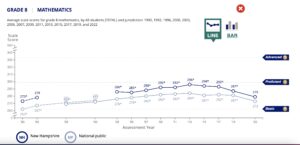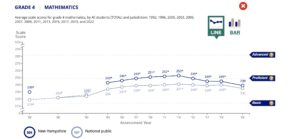Competency-Based Education (CBE) is a fundamental shift away from a knowledge-based education to a workforce training model. It was said during the Obama administration that he was going to redesign public education. Most people had no idea what he meant, but education researchers knew exactly what he intended to do to public schools across America.
CBE has been tried by individual states before. During the ’90s, they called it Outcome Based Education. Prior to OBE, they called it Mastery Learning. As parents eventually realized that the model shifted time away from learning the core academic subjects, they would demand an end to experimenting on their children.
CBE, coupled with the dumbed-down Common Core and Next Generation Science standards, are a big setup for failure in our public schools. Private schools wouldn’t touch this because they have to answer to parents who pay the tuition.
Schools across New Hampshire have been implementing changes inside the classroom for several years now. CBE officially started in New Hampshire in 2003. The move away from teacher-centered learning to student-centered learning has been sold as new and innovative, but anyone who researches education policies knows this is not new or innovative. Since CBE is workforce training, it starts in Kindergarten. Requiring teachers in every class to develop workforce skills now requires teachers to implement “skills” training into the day. But what does C.S. Lewis have to say about an education focused on training instead of knowledge?
Such training, he writes, “aims at making not a good man but a good banker, a good electrician, . . . or a good surgeon.” Lewis does admit the importance of such training–for we cannot do without bankers and electricians and surgeons–but the danger, as he sees it, is the pursuit of training at the expense of education. “If education is beaten by training, civilization dies,” he writes, for “the lesson of history” is that “civilization is a rarity, attained with difficulty and easily lost.” It is the liberal arts, not vocational training, that preserves civilization by producing reasonable men and responsible citizens.
Lewis goes on to note that this paradigm shift will result in a significant cost to the students and civilization. Why do children need knowledge? To avoid the errors of our time. Liberal Arts is a knowledge based model, CBE is a workforce skills-based model.
In “Why ‘Competency-Based Education’ Will Deepen America’s Education Crisis” published in The Federalist, Jane Robbin describes the problem with this shift away from a focus on knowledge to a focus on dumbed-down workforce training.
CBE: it aims not for excellent, but for good enough.
Since CBE is useless in academic disciplines that don’t lend themselves to digitally measurable outcomes, we’ll inevitably see further narrowing of curricula, so that the “measurable” disciplines crowd out the humanities. This fits well with the workforce-development philosophy of Common Core, which aims to convert all of K-12 education into utilitarian job-training.
This narrowing of curricula is more apparent than ever. Students in public schools are lucky to learn history, geography, or even the sciences during the school week. Gates and his cohorts of education reformers made it clear that the focus is on learning the minimum in math, reading, and writing. That’s why legislators had to pass a state law that schools must now teach cursive writing and multiplication facts. While some cheered for the passage of this law (for good reason), I kept pointing out that this law is a direct reflection of the failure of our public schools to teach academic content. No longer are they teaching basic academic content to children because they are focusing on training workers.
During the testimony before the House and Senate Education Committee, a few teachers testified that their students no longer understand the basics when it comes to Civics. Civics skills have been elevated instead. Your children may learn to become the best protesters and community organizers, but they may never know how a bill becomes a law, why we say the pledge of allegiance, and never read some of the most important founding documents.
A parent Litchfield recently contacted me about her child’s class stepping outside during the school day to protest getting people to stop at stop signs. What does that teach New Hampshire students? That’s a good question.
Take a look here at what 8th graders learned in 1954. See the difference between training and educating children?
Dumb down the core subjects with Common Core and Next Generation Science, then add the workforce training model that further dilutes quality academic content, and you end up with poor-quality instruction for children in our public schools.
Legislators try to add back what’s been eliminated, but what are our Governor and State Department of Education doing to improve public education? Why did Governor DeSantis prioritize improving academic standards in Florida, and students in New Hampshire are still subjected to dumbed-down standards, curricula, and tests? Why are our kids subjected to this failed model promoted by CBE gurus like Fred Bramante, who has no track record of improving public education in New Hampshire or anywhere else?
Jane Robbins ties CBE to digital tracking and data collection on students in public schools while, marginalizing or reducing teachers. Is this something parents asked for? During the school shutdowns, parents were clamoring to get their kids back into schools because they understood the value of the relationship between students and teachers.
If the goal is to force every American student into the data-collection system, this scheme works nicely.
Even worse, there’s little assurance that this enormously personal data—which should never have been collected in the first place—is secure from hacking. Federal investigations have uncovered the shocking lack of data security at USED, and stories of compromised student data are all too commonplace.
Bush and other CBE proponents don’t mention any of these considerations when touting competency-based training. Nor do they mention the effect on teachers, who would be marginalized if not ultimately replaced under CBE. If a teacher is reduced to merely unlocking the next computer screen when a student achieves a “competency,” why hire a professional when a less-expensive clerk will do?
There are problems in public education that certainly need to be addressed. We need teacher training to be focused on making sure the teacher knows the academic content, and has the best training to deliver it. We need better-quality academic standards and tests. We need to stop expecting public schools to address every social problem, and instead rely on social services outside the school system to address those needs.
Schools are now expected to address the mental and medical health of children. They are supposed to train them for the workforce and educate them on drugs, alcohol, gender, and radical race ideology.
The traditional liberal arts model would return public schools back to their mission which is to educate children. This would give them the ability to at least graduate with a base of knowledge to move into a career or attend college. Instead, the classroom has been watered down, and has become chaotic. This is innovative? It’s not only NOT innovative, it has been proven to be a failure. It makes you wonder if those in charge of education reform have some kind of intent to bring public schools to their knees in order to usher in more of their disastrous reforms.
If this listening tour comes to your town, ask Fred Bramante for the results. Show us all PEER REVIEWED and INDEPENDENT studies on New Hampshire students under the CBE model. He sells this model like a used-car salesman, he should show everyone how it’s working or NOT working!
Why is Fred Bramante re-writing the rules and now charged with selling them to the public? He’s been plugging for CBE in New Hampshire for years with no evidence that this scheme helps children or public schools.
Here are some sobering facts that will not be presented during this listening tour. Competency Based Ed was introduced in 2003. New Hampshire abolished the Carnegie Unit in 2005. New Hampshire districts were required to create competencies and begin measuring credit in these terms by the start of the 2008–09 school year.

Remember that radical 2Revolutions organization that pushes Critical Race Theory in public schools? They were involved in ushering in Competency Based Education in New Hampshire:
New Hampshire educators as well as the appropriate content area state associations working with the National Center for Assessment and the Center for Collaborative Education. In addition, the NHDOE hired 2Revolutions, an education design and consulting firm, to run the New Hampshire Network Strategy, an initiative to connect educators throughout the state so that they can share and build resources in areas such as data collection, performance assessment, and professional development in support of new competency-based models.
Before moving ahead with this model, the Commissioner should have commissioned an independent and peer reviewed study to determine what is working, and what is not working. There may be some components to this model that are worth noting, and promoting in our schools. However, as the students in Sanborn revealed, under Brian Stack’s tenure as Principal, Competency Based Education was a big problem. Brian Stack is now a CBE consultant and was part of the team who drafted new education rules for The New Hampshire Department of Education. Fred Bramante’s non-profit was tasked with developing the Education Rules for New Hampshire’s public schools.
The new rules reflect another big step towards the Competency Based Education model that will be forced on public schools, and teachers across the state. After two decades of this snake oil called Competency Based Education, New Hampshire is full steam ahead. Make sure you read what the students in Sanborn reported, then start demanding real answers from these players. One thing’s for sure, you will not get that kind of critical analysis from the people selling CBE in New Hampshire.



